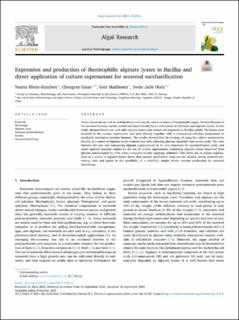Expression and production of thermophilic alginate lyases in Bacillus and direct application of culture supernatant for seaweed saccharification
Peer reviewed, Journal article
Published version
Date
2021Metadata
Show full item recordCollections
Abstract
Brown seaweeds are rich in carbohydrates and may be used as a source of fermentable sugars. Saccharification of the seaweed biomass can be carried out enzymatically by a combination of cellulases and alginate lyases. In this study, thermotolerant exo- and endo alginate lyases were cloned and expressed in Bacillus subtilis. The lyases were secreted to the culture supernatant and used directly together with a commercial cellulase preparation to saccharify Saccharina latissima biomass. The results showed that the strategy of using the culture supernatants directly as a source of alginate lyases worked very well, releasing glucose, mannitol, and uronic acids. The ratio between the exo- and endo-acting alginate lyases proved to be very important for saccharification yield, and under optimal reaction conditions the use of culture supernatants containing alginate lyases improved final glucose concentration by 73%, when compared to only applying cellulases. This direct use of culture supernatants as a source of alginate lyases shows that enzyme purification steps are not needed, saving seaweed processing costs and points to the possibility of a relatively simple on-site enzyme production for seaweed biorefining.
